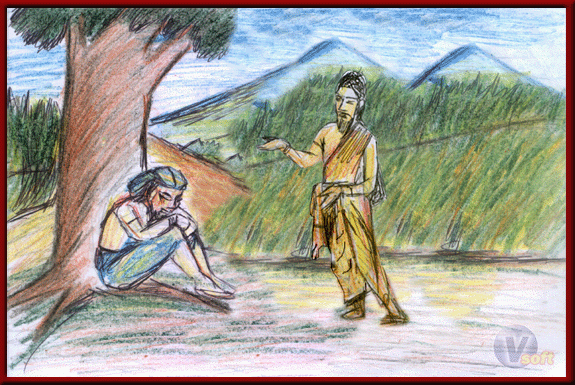303. The Bothisatta And His Son

Once upon a time, when Brahadatta was king in Benares, the Bodhisatta was born into a brahmin family of great wealth, and after his education was finished managed the estate. Then his wife gave birth a son, and died. He thought, “What is this life without my beloved wife? What is a home to me. I will become an ascetic.” So forsaking his lusts, he went with his son to Himalayas and with him entered upon the ascetic life, developed the mystic Trance and transcendent Knowledge, and dwelt in the woods, supporting life on fruits and roots.
At that time the borderers raided the countryside; and having assailed a town, and taken prisoners returned to the border. Amongst them was a maiden, beautiful, but endowed with all a hypocrite’s cunning. This girl thought to herself, “These men, when they have carried us off home, will use us as slaves; I must find some way to escape.” So she said, “My lord, I wish to retire; let me go and stay away for a moment.” Thus she deceived the robbers, and fled.
Now the Bodhisatta had gone out to fetch fruits, leaving his son in the hut. While he was away, this girl, as she wandered about in the forest, came to the hut, in the morning and tempting the son of the ascetic with desire of love, destroyed his virtue, and got him under her power. She said to him, “Why dwell here in the forest? Come, let us go to a village and make a home for ourselves. There it is easy to enjoy all the pleasures and passions of sense.” He consented, and said, “My father is now out in the woods looking for wild fruits. When we have seen him, we will both go away together.” Then the girl thought, “This young innocent knows nothing; but his father must have become an ascetic in his old age. When he comes in, he will want to know what I do here, and beat me, and drag me out by the feet, and throw me into the forest. I will get clear away before he comes.” So she said to the lad, “I will go first, and you may follow”; then pointing out the landmarks, she departed. After she had gone, the lad became sorrowful, and did none of his duties as he was used; but wrapped himself up head and all, and lay down within the hut, fretting.
When the Great Being came in with his wild fruits, he observed the girl’s footmark. “That is a woman’s footprint,” thought he; “my son’s virtue must have been lost.” Then he entered the hut, and laid down the wild fruit, and questioned his son:
“No wood is chopped, and you have brought no water from the pool,
No fire is kindled: why do you lie mooning like a fool?”
Hearing his father’s voice, the lad rose, and greeted him and with all respect made known that he could not endure a forest life:
“I cannot live in forests: this, O Kassapa, I swear;
Hard is the woodland life, and back to men I would repair.
Teach me, O brahmin, when I leave, that wheresoever I go,
The customs of the countryside I may most fully know.”
“Very good, my son,” said the Great Being, “I will tell you the customs of the county.” And he said:
“If it is your mind to leave behind the woodland fruits and roots
And dwell in cities, hear me teach the way which that life suits
Keep clear of every precipice, from poison keep afar,
Sit never in the mud, walk with care where serpents are.”
The ascetic’ son not understanding this pithy counsel, asked:
“What has your precipice to do with the religious way,
Your mud, your poison, and your snake? Come tell me this.”
The other explained:
“There is a liquor in the world, my son, that men call wine,
Fragrant, delicious, honey-sweet, and cheap, of flavor fine
This, Narada, for holy men is poison, say the wise.
And women in the world can set fools’ wits a whirling round,
They catch young hearts, as hurricanes catch cotton from the ground
The precipice I mean is this before the good man lies.
High honours shown by other men, respect and fame and gain,
This is the mud, O Narada, which holy men may stain.
Great monarchs with their retinue have in that world dwelling,
And they are great, O Narada, and each a mighty king
Before the feet of sovereign lords and monarchs walk not thou,
For, Narada, these are the snakes of whom I spake just now.
The house thou comest to for food, when men sit down to meat,
If thou see good within that house, there take thy fill, and eat.
When by another entertained with food or drink, this do:
Eat not too much, nor drink too much, and fleshly lusts eschew.
From gossip, drink, lewd company, and shops of goldsmith’s ware,
Keep thou afar as those who by the uneven pathway fare.”
As his father went on talking and talking, the lad came to his senses, and said, “Enough of the world for me, dear father!” Then his father instructed him how to develop kindliness and other good feelings. The son followed his father’s instruction, and caused the ecstasy of mystic meditation to spring up within him. And both of them, father and son, without a break in the trance, were born again in the world of Brahma.


Leave a Reply